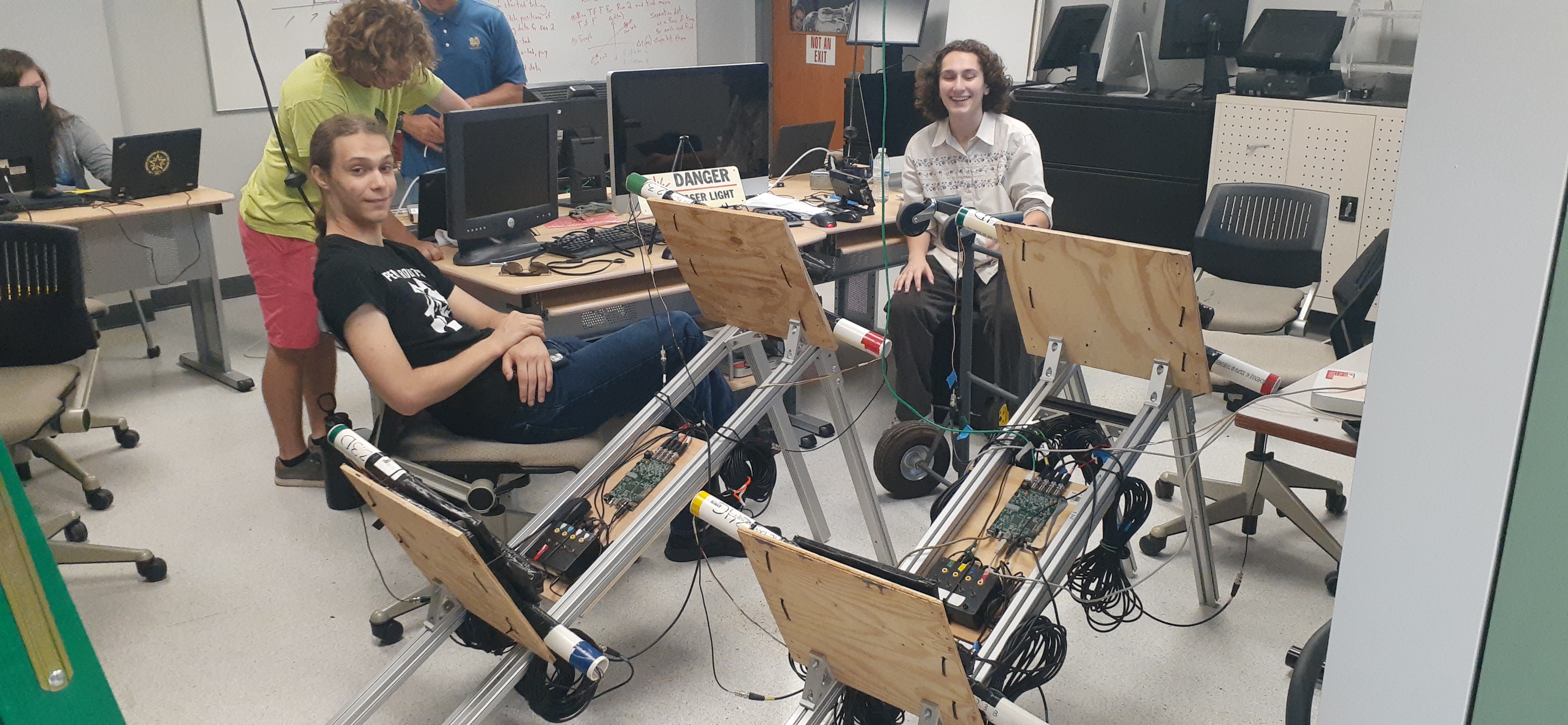Friday Flyer - January 20, 2023

Spotlight on the University of Notre Dame QuarkNet Center
The Notre Dame center has been pretty busy in the past year. Students from nearby St. Joseph High School and not-as-nearby Winamac Community High School participated in MINERvA masterclasses on different days in March, after which the teachers prepared for their extensive summer program. At Notre Dame, the University supports summer research by teachers and students, which ranges from cosmic ray studies to CMS data analysis to new detector technologies. Among the highlights of the summer was the construction of 48 Cosmic Watch detectors for testing by QuarkNet under the direction of teacher Dan Kallenberg and Senior Tech Dan Ruggiero, and the addition of visiting teacher Miki Ohtsuka from not-at-all nearby Waseda Honjo Senior High School in Japan. The last week of the summer program was held jointly with the Virtual QuarkNet Center at Notre Dame and included additional programs that teachers in both groups could join. The synergy with the talented "Virtuals" was great. The Notre Dame center was visited in summer and fall by students on two different Pokagon Band Tribal K-12 field trips, sponsored by the Department of Defense. Also in autumn, students from Winamac participated with teacher Jeremy Wegner in World Wide Data Day and International Cosmic Day, the latter with a cosmic ray detector on an airplane. All throughout the academic year, Notre Dame QuarkNet teachers met weekly on Monday afternoons, exchanging ideas, issues, and laughs.


News from QuarkNet Central
Summer Workshops at CERN: The University of Michigan RET program and QuarkNet have teamed up to enable eight U.S. QuarkNet teachers to attend a CERN teacher program this summer with expenses and stipend paid. You can learn more about these programs, High School Teachers (HST, July 2-15) and International Teacher Weeks (ITW, August 6-19) at the CERN International Teacher Programmes pages. To apply, fill out the QuarkNet CERN Summer 2023 application and send Ken a recommendation from your QN mentor, a supervisor, or a colleague. The due date is February 3, 2023.
International Muon Week: Student groups around the world will use cosmic ray detectors to measure the muon flux, February 13-24. An international map will show participants' locations and their results. Students can also participate in video conferences hosted from Fermilab during the second week to discuss their results. To get started, fill out the registration form. To learn more, contact Mark.
International Masterclasses: IMC starts February 10 for CERN videoconferences and February 25 for Fermilab videoconferences. It is not too late to register! Prospective masterclass leaders should check the Fermilab videoconference schedule or one of the other schedules and pick a day and time that works for your institution. Next, send an email to Ken, Shane, or Spencer. Teachers, you will be eligible for a stipend for participating in a masterclass orientation or for bringing students to a masterclass on a non-school day. We would sure like to see your QuarkNet center in IMC!
Orientations begin next week. Most are done online and are useful for mentors and teachers. Learn more in the Orientations Library pages for LHC or MINERvA masterclasses and contact Spencer, Shane, or Ken to sign up. Orientations do not take long and are a great way to ramp up the teachers and any new team members. (Teacher can get a stipend for this as well.)
Yet more news! Read the latest IMC circular here!
RFP: It is not too early to think about your 2023 QuarkNet program. The QuarkNet Request for Proposals for centers is now available so that you can crystallize ideas and request resources. Please complete this form by February 3, 2023. Note that QuarkNet will continue to support both in-person and virtual experiences in 2023.
Annual Reports: If you have not yet submitted your annual report for 2022, please do so ASAP. Here are instructions for submitting your report. If you have any questions, please let Ken or Shane know.
Server outage tonight: QuarkNet IT will perform some routine maintenance to the e-Lab servers this evening, January 20. Expect the e-Labs, the CMS programs CIMA and iSpy, the Arachne event display and the main QuarkNet website quarknet.org to be unavailable this evening from 7 pm CT to 9 pm CT. Please don't start any uploads or analyses unless you're sure they'll complete by 8pm.

Physics Experiment Roundup
Things are cooking in Fermilab News. They report that at Sanford Lab, evacuation of the big caverns is halfway done and that on-site at Fermilab, construction of the new PIP-II accelerator has cleared a major hurdle. Meanwhile, we learn from APS Physics that anomalies in measurement of reactor antineutrinos may be on their way to being explained. Over at Brookhaven Lab, the Relativistic Heavy Ion collider (RHIC) seems to show unexpected preferences in particle spins, according to SciTech Daily via Interactions. In CERN Courier, also via Interactions, we find news about ATLAS upgrades for high luminosity.

Resources
Again, we are about videos, Don Lincoln has a video that goes supernova and Kirsty Duffy in Even Bananas explains how we can probe the big bang with neutrinos. Here is a video about that interesting W mass measurement from CDF at Fermilab. And if you are wondering about what we mean by a 5 sigma discovery, check out the 5 sigma video!

Just for Fun
Art at Fermilab! They have a new guest composer, according to Fermilab News. And according to Symmetry, former Fermilab post-doc - and masterclass moderator - Teppei Katori has been making amazing forays into art and music inspired by particle physics.
XKCD explores hydrogen and bowling.
QuarkNet Staff
Mark Adams: adams@fnal.gov
Ken Cecire: kcecire@nd.edu
Spencer Pasero: spasero@fnal.gov
Shane Wood: swood5@nd.edu
